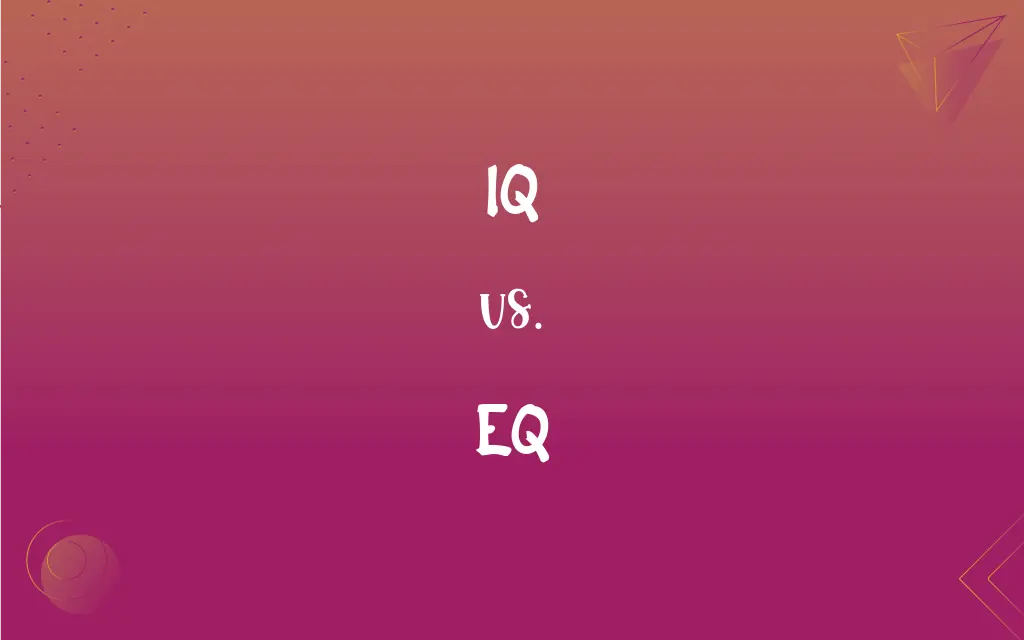IQ vs. EQ: What's the Difference?
Edited by Harlon Moss || By Janet White || Updated on November 16, 2023
IQ measures cognitive intelligence and problem-solving abilities, while EQ assesses emotional intelligence and interpersonal skills.

Key Differences
IQ, or Intelligence Quotient, is a metric that evaluates a person's cognitive abilities. It's primarily concerned with logical reasoning, mathematical skills, and verbal aptitude. Tests designed to measure IQ often focus on pattern recognition, memory, and problem-solving tasks. In contrast, EQ, or Emotional Quotient, gauges a person's emotional intelligence. It examines how one recognizes, understands, and manages emotions, both within oneself and in interactions with others.
IQ has long been a standard for predicting academic and professional success. High IQ scores are often linked to enhanced logical reasoning, faster learning, and the capacity to handle complex tasks. However, EQ dives deep into interpersonal skills and self-awareness. Individuals with high EQ are typically adept at understanding their emotions, regulating them, and empathizing with others, which often leads to more effective communication and relationship-building.
When considering personal development, enhancing IQ might involve challenging the brain with puzzles, reading, or academic pursuits. On the other hand, EQ development often encompasses self-reflection, meditation, counseling, or engaging in group activities to understand social dynamics better. It's important to understand that while IQ might offer an edge in analytical tasks, EQ often determines how one navigates social situations and forms connections.
School systems traditionally prioritize IQ, with emphasis on exams, grades, and standardized tests. However, there's a growing realization of the value of EQ, with many educational institutions incorporating programs to bolster emotional intelligence, recognizing its role in overall well-being and societal integration. The significance of both IQ and EQ cannot be understated, as they collectively influence an individual's ability to succeed in various aspects of life.
Comparison Chart
Primary Focus
Cognitive abilities and reasoning.
Emotional understanding and management.
ADVERTISEMENT
Measurement
Tests based on logic, math, and verbal skills.
Assessments of empathy, self-awareness, and social skills.
Development
Enhanced by academic challenges and brain exercises.
Boosted by self-reflection, counseling, and social interactions.
Role in Education
Central in traditional education systems.
Gaining importance in modern curricula.
Impact on Success
Often predicts academic and analytical success.
Crucial for relationship-building and interpersonal success.
IQ and EQ Definitions
IQ
A gauge of intellectual capabilities relative to a general population.
IQ tests aim to provide a consistent measure of cognitive potential.
ADVERTISEMENT
EQ
A measure of an individual's ability to understand, interpret, and respond to emotions.
His high EQ made him excellent at resolving conflicts.
IQ
A numerical score on a standardized test, intended to measure cognitive abilities.
Her IQ is 130, placing her in the top 2% of the population.
EQ
An assessment of one's emotional self-awareness and interpersonal skills.
With a strong EQ, she navigated social situations effortlessly.
IQ
An assessment of an individual's ability to think, reason, and solve problems.
With a high IQ, he easily tackled the most complex puzzles.
EQ
A gauge of emotional adaptability and empathy toward others.
EQ plays a critical role in leadership, fostering team cohesion.
IQ
An index of logical, mathematical, and verbal proficiencies.
While her IQ indicated strong logical skills, she also excelled creatively.
EQ
A metric indicating the potential for relationship-building and emotional resilience.
His EQ was a significant factor in his success as a therapist.
IQ
A metric often linked to academic and professional aptitudes.
Many elite institutions consider IQ scores during admissions.
EQ
An index reflecting the capability to manage personal emotions and recognize others'.
Despite the setback, her EQ enabled a calm, measured response.
IQ
A measure of a person's intelligence as indicated by an intelligence test; the ratio of a person's mental age to their chronological age (multiplied by 100).
EQ
Emotional intelligence.
IQ
A measure of a person's intelligence as indicated by an intelligence test; the ratio of a person's mental age to their chronological age (multiplied by 100)
EQ
Abbreviation of equation
EQ
The atomic weight of an element that has the same combining capacity as a given weight of another element; the standard is 8 for oxygen
FAQs
Do standard intelligence tests measure EQ?
No, standard IQ tests measure cognitive skills, not emotional intelligence.
Is EQ more important than IQ in relationships?
While both matter, EQ often plays a pivotal role in forming and maintaining relationships.
What does IQ stand for?
IQ stands for Intelligence Quotient.
How is EQ different from IQ?
While IQ measures cognitive abilities, EQ assesses emotional intelligence.
Does EQ influence mental health?
Yes, a higher EQ often correlates with better emotional regulation and mental well-being.
Can IQ change over time?
Though largely stable, IQ can change slightly with education and environmental factors.
Is EQ innate or learned?
While there's an innate component, life experiences significantly shape EQ.
Are high IQ individuals always successful?
While IQ can predict certain successes, many factors, including EQ, influence overall achievement.
Can training improve IQ?
While you can enhance cognitive skills, drastically changing IQ is debated.
Are there limits to measuring IQ?
Yes, IQ tests have cultural and educational biases and don't encompass all intelligence forms.
How can companies benefit from employees with high EQ?
High EQ employees often enhance team dynamics, client relations, and conflict resolution.
Is there a link between EQ and leadership?
Definitely, many successful leaders possess high levels of emotional intelligence.
Are IQ and EQ the only measures of intelligence?
No, they're prominent metrics, but there are various intelligence forms, including creative and practical intelligence.
How can I improve my EQ?
Self-awareness, empathy exercises, and social interactions can help boost EQ.
Does IQ correlate with creativity?
While related, high IQ doesn't guarantee creativity, and vice versa.
How is IQ typically tested?
Through standardized tests focusing on verbal, mathematical, and spatial skills.
Can EQ be misinterpreted?
Yes, someone might seem emotionally intelligent but may not have genuine empathy or self-awareness.
Do high IQ scores guarantee academic success?
While it aids, other factors like motivation, environment, and EQ also play roles.
Can children be taught EQ?
Absolutely, children can learn emotional intelligence through modeling, guidance, and experience.
Can too high an IQ be a problem?
In some cases, very high IQ might lead to social isolation or overthinking, but it varies by individual.
About Author
Written by
Janet WhiteJanet White has been an esteemed writer and blogger for Difference Wiki. Holding a Master's degree in Science and Medical Journalism from the prestigious Boston University, she has consistently demonstrated her expertise and passion for her field. When she's not immersed in her work, Janet relishes her time exercising, delving into a good book, and cherishing moments with friends and family.
Edited by
Harlon MossHarlon is a seasoned quality moderator and accomplished content writer for Difference Wiki. An alumnus of the prestigious University of California, he earned his degree in Computer Science. Leveraging his academic background, Harlon brings a meticulous and informed perspective to his work, ensuring content accuracy and excellence.







































































